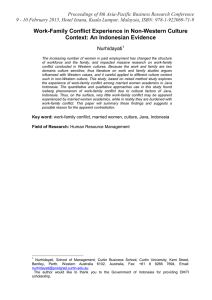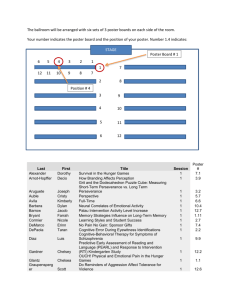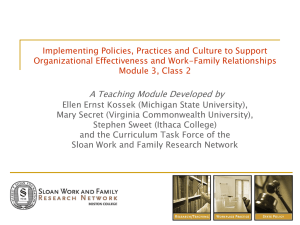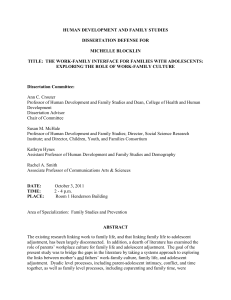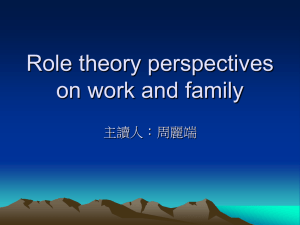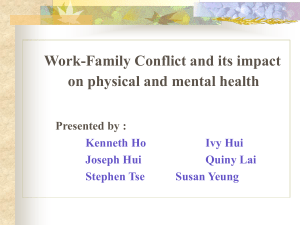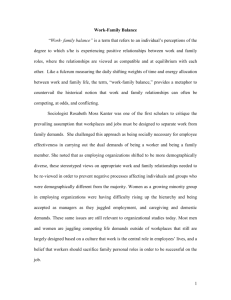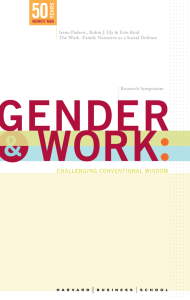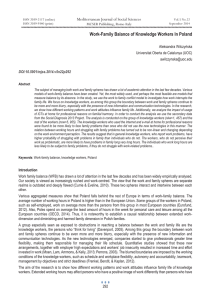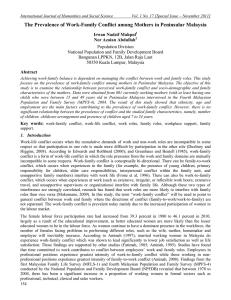Cross-Cultural Work-Family Interfaces: Work Family Conflict— China
advertisement
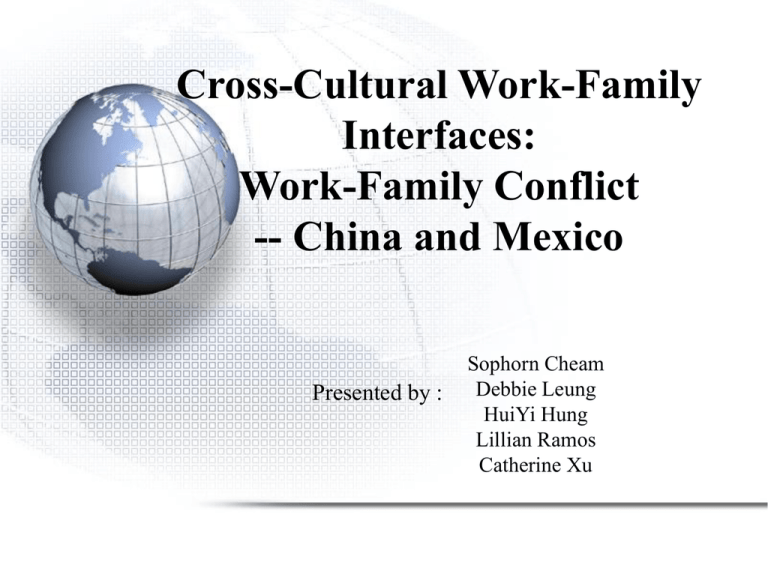
Cross-Cultural Work-Family Interfaces: Work-Family Conflict -- China and Mexico Presented by : Sophorn Cheam Debbie Leung HuiYi Hung Lillian Ramos Catherine Xu Cross-Cultural Work-Family Interfaces: - Work-Family Conflict Outline: • Definition of Work-Family Conflict • Causes of Work Family Conflict • Work-Family Policies • Approaching Differences • Concerns Rise from Differences Work-Family Conflict Defined Work and family demands become imbalanced Differences & conflict of dual breadwinners & traditional family roles Identity Theory • -- Burke, 1996; Thoits, 1991 Women: professional life vs. traditional role Job stressors, job involvement leads to job distress and depression Countries Comparison Pop. per capita Countries Growth GNP Rate Type of Economy Family Culture Mexico 5,070 1.2-1.4% Service Patriarchal authoritarian China 840 0.7% Manufacturing Utiliarianistic familism Source: The Macro-environment and Work-Family Conflict: Development of a Cross Culture Comparative Framework Mexico Traditional family- “patriarchal-authoritarian,” – meaning that family is important & father has domination over entire family. Females role is at home. • When the requirement to have the woman become a mother and employee increases the stress because it’s not a cultural norm to have women work. Low per capita GNP, depends on a service related economy, relatively high population growth rate creates largest amount of strain on families. China Chinese tradition is “utilitarianistic familism,” • which is a tendency to place family interests above those of the individual. Work role is a means to an end, the end is the family’s financial security Low per capita GNP, country depends on manufacturing related economy, largest population can be an indication of economic strain on families. Causes of Work-Family Conflict & Family-Work Conflict Time devoted to one role makes it difficult to participate in another role WIF: Higher the position, greater the responsibilities • This would lead to more time away from the family FIW: Chores and family commitments would intrude on time needed to successfully complete tasks on the job The bottom line: STRESS Work Interfering with Family (WIF) Driven by the MNE’s need for the almighty “buck” and the ever-present threat of being called back prematurely Expatriate would feel pressure to put the time in at work. Family Interfering with Work (FIW) Being away from the familiar scenes of home and friends Family members need more support to help them through the “critical part” of adjustment. Health Concerns Several studies have linked these two types of conflicts with: • Increased occurrence of hypertension, alcoholism, • depression, psychological illness and A general dissatisfaction with life Resulting in high turnover, absenteeism, low morale and poor performance. In the War of Work-Family Balance… Retention strategies used by the best U.S. corporations: • Money Unfortunately, there’s something that money cannot buy!! A Better Solution…. Family-friendly benefits: • Impact of job stress on family life and health • Influence employees’ decisions to stay or leave Why is Family-Friendly Policy Important? Full-time employees work longer on average than 20 years ago 51% of families with children have 2 working parents, which is a 54% increase since 1977 (Abram, 2004). What do the U.S. Firms Do Now? CISCO On-site store, dry cleaning service, a fitness center. 4 on-site childcare centers in New Jersey Merck & Co. and Pennsylvania with capacity of 900 children. Spent 4.5 million in 2003 to expend its SC S.C. Johnson Johnson’s Childcare Learning Center. Source: http://scjohnson.com Are Working-mothers the Biggest Winner? Not true !! • X-generation working dads spend 3.5 hours a • • day with their kids 70% of working men would take pay cut to spend more time with family Almost 50% would turn down a promotion if family time will be less. (Families & Work Institute, 2002) Work-Family Conflict: - A Business Issue The concept of both work and family have different significance and importance in different countries/cultures Presence of family-supportive governmental policies moderate relationships between: • Demands, Resources, and Work-Family Conflicts Companies have been developing family-friendly policies and practices • To alleviate tensions between these central life domains. What Leads to Differences in Approaching Work-Family Conflict? “Work-Family Conflict is based on a fairly simple theoretical perspective of role theory • Where conflicting demands coming from the two central roles in our life lead to strain.” Job dissatisfaction is associated with WFC Work resources: organizational & supervisor support relate to less WFC Approaching Work-Family Conflict Differently Looking cross-nationally there are large discrepancies in the usefulness of specific practices of policies. Childcare centers appeal to a large amount of people in the US Whereas, in Mexico childcare centers are less relevant and critical Explaining the Variance Between Different Cultures China: U.S. & Mexico: Life satisfaction of Chinese employees is influenced primarily by Work-Family conflict American and Mexican employees are influenced primarily by Family-Work Conflict Chinese people assign priority to work over family Americans and Mexicans prioritize family over work Explaining the Variance Between Different Cultures (cont.) Employees and families in China and Mexico view working long hours differently than American employees and families. Differences are due to: • The existence of more family ties in China and Mexico, which allow people in the two countries to focus more on work. Legal Issues Workweek U.S. China Mexico 40 hours 44 hours 48 hours •150% normally •200% on day off •300% on holidays •Double normal rate •4 festivals •7 days, •2 weeks paid Christmas bonus •Normally 150% of Overtime regular paid •Varies Holidays •Not required, •Agreement Concerns Risen From Differences Among Countries Childcare support U.S. China Mexico Babysitters, parents Grandparents Mothers Preschools Formal preschool system Fewer childcare centers available Concerns Risen From Differences Among Countries Overtime work pattern: U.S. China & Mexico Bring work home Stay at office Reasons: Technological constraint Show effort of bringing propriety to family Conclusion Work-Family Conflict: • Affect expatriate decision • Related to cultural perception • Benefit from organizational and social support Questions?
